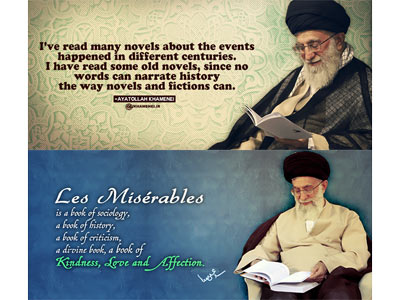Supreme Reader
Iran's Ali Khamenei wants you to know how much he enjoys books.
 Almost every major political figure has a social-media presence today. Chechen strongman Ramzan Kadyrov is an Instagram addict, as is Syria’s first family. Hugo Chavez was a prolific tweeter, and Fidel Castro blogs occasionally. Iowa senator Chuck Grassley live-tweets University of Northern Iowa Panthers women’s volleyball matches. Yet nobody’s quite as strange as Iran’s Supreme Tweeter, Ayatollah Ali Khamenei. He’s on Instagram, Twitter and Facebook, even though the last two have been blocked in Iran. And while all three accounts are almost certainly managed by his office rather than the Rahbar himself, they still have the remarkably ad hoc and disorganized feel you’d expect from a seventy-four-year-old cleric learning the digital ropes. He uses hashtags poorly. He offers opinions almost at random, dredging up lines from decades-old speeches without explaining why they bear relevance to his audience today. He’s translated into imperfect English, and abbreviates words like a teenager—“Do ur scientific works in a way that Westerners learn #Farsi 2 read ur articles.Farsi has such capacity that can Xpress most subtle sciences”. And like Grassley, he enjoys volleyball. The Ayatollah begs to be hipper.
Almost every major political figure has a social-media presence today. Chechen strongman Ramzan Kadyrov is an Instagram addict, as is Syria’s first family. Hugo Chavez was a prolific tweeter, and Fidel Castro blogs occasionally. Iowa senator Chuck Grassley live-tweets University of Northern Iowa Panthers women’s volleyball matches. Yet nobody’s quite as strange as Iran’s Supreme Tweeter, Ayatollah Ali Khamenei. He’s on Instagram, Twitter and Facebook, even though the last two have been blocked in Iran. And while all three accounts are almost certainly managed by his office rather than the Rahbar himself, they still have the remarkably ad hoc and disorganized feel you’d expect from a seventy-four-year-old cleric learning the digital ropes. He uses hashtags poorly. He offers opinions almost at random, dredging up lines from decades-old speeches without explaining why they bear relevance to his audience today. He’s translated into imperfect English, and abbreviates words like a teenager—“Do ur scientific works in a way that Westerners learn #Farsi 2 read ur articles.Farsi has such capacity that can Xpress most subtle sciences”. And like Grassley, he enjoys volleyball. The Ayatollah begs to be hipper.
Yet in the last few days, the Ayatollah’s social-media team has mounted something like a PR campaign, with the apparent goal of showing the world that Khamenei is no medieval scold, but a modern Renaissance man, a voracious reader and a real intellectual. And so there have been two bursts, on multiple platforms, of posts about the Leader’s love for literature. He’d like you to know that he favors novels over nonfiction—“The Historical narrative [...] can show photos of a city taken from a 10 thousand feet altitude. On the other hand, in an artistic narrative you can well imagine that you have got into a city.” And he’d like you to know that he’s read a lot of them, and he names a handful as proof—“I have read plenty of novels that relate to the events of different centuries. I have also read some very old novels. For instance I have read the Divine Comedy, Amir Arsalan, One Thousand and One Nights.” He doesn’t like all novels, of course—“some #novels r mere fantasy&have no message&shouldn’t be read,” but he wants to remind you that nobody stops him from reading them anyway—“Although I’ve also read those novels since no 1 has ever told what to read”. He also would like to to know when he reads them—on the bus and in other spare moments. He brags that this has enabled him to read “maybe hundreds of books.” And he knows “many ppl who’ve done the same.”
Yet it’s not enough for you to know what a great mind Khamenei is—he wants you to emulate him. “We should habituate ourselves&our #children 2read #books;eg 2read books when they want 2go 2bed or hours of Fridays & summer #holidays.” “Once they get home, all working ppl should spend at least half an hour on reading;lots of works can be read during these 30min of free times”. And this is how all of Khamenei’s hobbies and habits are. They aim to humanize him, to show his personality, but without failing to show him as great. He reads like you, yes, but he reads more, he reads it with more taste, and he reads it with more discipline. Perhaps next week he’ll tell us of his great humility.
The irony in Khamenei’s self-promotion is deep. For while “no 1 has ever told [him] what to read,” his regime tells his subjects what to read. The internet is heavily and meticulously censored. Books are often banned—including some of the classics. And Iran’s greatest contribution to world culture, its poetry, faces censorship. And so it should be no surprise that the leader of a country with a deep literary culture and a deep sense of nationalism still would pick a foreign novel—Victor Hugo’s Les Misérables, which he brands “a miracle in the world of novel writing”—as his favorite. Khamenei has seen to it that many great Persian novels—like Sadegh Hedayat’s mesmerizing The Blind Owl—are kept off the presses. Iran’s new president, Hassan Rowhani, has dropped hints about easing controls, and Twitter and Facebook were partially unblocked yesterday. But until then, Iranian readers face another year of chains on the galleys with Jean Valjean and Ali Khamenei.
